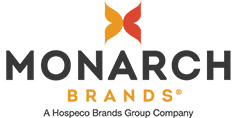Monarch Brands Says Goodbye to a Pillar of the Company
After 40 years of putting the company first, our longest tenured employee will leave us to focus on family and community.
Mike Klausman is a firm believer in putting the family company first. His motto ‘take care of the family, and the family will take care of you’ is a testament to his 40-year success. I sat down with Mike to understand more his life’s work. But first a little background:
Mike met Joel Kanefsky in August of 1967. Joel worked with his father Al and uncle Ben at ABWiper to repurpose textiles into industrial wiping rags. At the time, the company was purchasing a used carton business to ship the rags (the family wasted nothing in the post-war economy). Mike was in retail, but the family liked Mike’s hustle, so hired him to run the carton company. ABWiper’s rag and carton business soon grew to a point where running two businesses out of a five-story warehouse in Manayunk was impossible.
As the margin on rags was slightly higher, Mike transitioned into the rag business, leveraging his operations knowledge to purchase product, sell, and help run the business. Young Mike admired how the Kanefsky’s rolled up their sleeves and worked alongside employees. Al was a genius with machinery and navigating trucks in tight spaces, Joel worked the lines, packing boxes and put out fires. If you’ve met Mike, you may now understand why he’s so tenacious about every aspect of the company today. If Mike sees a problem, Mike fixes a problem.
As the company grew, the company diversified. When the rag business stagnated, ABWiper started to develop textile seconds (imperfects at deeply discounted prices). Mike worked to source the textiles that would evolve ABWiper into current-day Monarch Brands. Today, the company continues to grow exponentially, but for the first time in 40 years, we will have to move forward without a founding pillar of the workforce.
AM: What has impacted you the most during the course of your career?
MK: I’ve seen many changes in the industry during his career, but none so dramatic as the sunset of the American mill industry. As American work/life standards rose, many labor-intensive sectors relocated overseas to take advantage of cheaper labor sources. The majority of American mills produce fabric for cut & sew companies to finish. Cut & sew manufacturers, heavily-reliant on semi-skilled manual labor, set up shop in the middle-east and purchased fabric locally, or set up their own mills. With the advent of container shipping, textile production flourished in India, Pakistan, Bangladesh, and China. While textiles may be cheaper today, order timelines have quadrupled. You cannot turn to an American mill and have towels in two weeks anymore; new products take 120 days to bring in, while re-orders take 90 days.
AM: What has remained constant?
MK: I have to say that the Kanefsky family has been good to me. The company has always risen to a challenge to grow and reinvent itself. Hal, the third generation Kanefsky, has made the company 10x the size that it was when he came on board. He recognized that the mills were closing and toured the world to find and build relationships with foreign sources (in fact, this was a condition of coming on board). He hired former mill executives to run his sourcing department, agents in foreign countries to represent his interests, and 3rd party inspections companies to ensure quality.
AM: What has remained constant with you, specifically?
MK: I’ve always built relationships, not sales. I find that if you care about the person, and ask about their day, then they will open up to you, and the sales will come. Every holiday I send little messages to my clients. It takes time, but they appreciate the effort. Of course, nowadays people have less time, so I always have to judge when somebody is in a hurry. The last thing you want to be is a burden. Sometimes, things go wrong. When an order goes wrong, regardless of fault, a customer who really knows you will give you that second shot.
AM: Outside of the Kanefskys, who has been your greatest influence?
MK: I’ve had the good fortune to build rapport over time with people like Bill Wright of John R. Lyman and Norman Saul of CCP. We were competing for the same business, but we were gentlemen about it. This is going back 30 years now. As a young man, I would have questions, and these gentlemen would answer honestly and care about my success. There was enough business for all of us. We built strategic alliances so that our clients never had to stray if we were out of an item. We all believed that you do everything you can to make sure the customer has what the customer needs.
AM: What did you like most about the business?
MK: I enjoyed getting out, meeting new people, and helping them solve their problems. I used to travel more to consult with facilities what needed specific products. I think the strangest project was helping a nuclear plant to develop halogen chloride wipes to strip out any corrosion and minerals out of the cooling tanks. My customers make me happy. I enjoy talking to them; I enjoy making their day by making things easy for them.
AM: So, what’s the quickest way to lose a customer?
MK: Knowingly send a different or sub-standard product to a customer. In this business, it’s hard to win and lose business, but I have won a number of accounts when their existing vendors substituted a product without letting them know about the switch. Not following up is another way to lose a customer. If you don’t hold yourself accountable by reaching out to ask how the product is working, you will find yourself replaced. You don’t build a relationship through email. Email is a cold machine-like communication medium. You must call to hear their inflection, their tone, their pains or satisfaction with a product.
AM: What other advice would you give to a young rep?
MK: Make the customer’s life easy. Be on top of your game, communicate, and be there for them before they realize you need them. To do this, you must know the product, and provide them with what they need, rather than what they’ve requested. For the most part, we’re selling tools. If we can provide our customers with a more efficient or less expensive way to clean, or look after guests, then they will always come back. Also, always look after the family. Always make sure that the company is covered during an emergency. Yes, you have to be competitive, but you must also plan for the truck breaking down, or the forklift running into an elevator. If I can keep the company happy, then everybody will be happy.
AM: How do you think company’s future is looking?
MK: I think that with this new facility, and all the new technology that is in the works, that Monarch Brands is setting the stage for a bright future. The one piece of advice I would give is that you always need more inventory than you think you need. You must have back up stock for your back up stock. You lose a customer if you can’t get them what they need. The new rack system and inventory scanning software will help ensure accurate stock levels moving forward.
AM: What’s next for you?
MK: I’m not getting up early; I can tell you that! I’m going to take a week or so and just see what it’s like to not have a schedule. I’ll spend time with my family. I will volunteer at a center that helps seniors. I can drive folks to their doctors appointments, and just spend time talking with them. My wife attends lecture courses with friends, so I’ll finally be able to do that. We will go on our annual cruise. People always ask us to stay with them when we’re traveling, I’ve never had the luxury of accepting their offer. Now, I will have time to relax, and take in life.
AM: Mike, thank you for your contribution to the company, you are irreplaceable, and I know we’ll miss you.
-By Andrew Moore
&nbs
p;






